Table of contents
- Why your ex stalks you online
- 1. Emotional attachment
- 2. Jealousy and comparisons
- 3. The fear of loss
- 4. Revenge
- 5. Obsession
- Potential consequences of being stalked by your ex online
- 1. Physical security issues
- 2. Social isolation
- 3. Emotional distress
- How to stop your ex from stalking you on the Internet
- 1. Tell your ex to stop stalking you, then block them
- 2. Take steps to improve your online privacy
- 3. Save everything that can prove that you are being stalked
- 4. Make a safety plan
- 5. Consider taking legal action against the cyberstalker
- Conclusion
Why your ex stalks you online
Unfortunately, people spy on their ex-partners online for a range of reasons. Understanding the motivations behind why your ex is stalking you can help you take action to prevent further stalking.
1. Emotional attachment
One possible reason someone might stalk their ex-partner is that they have a lingering emotional attachment. Despite breaking up, they may still have strong feelings and want to get back with their ex.
By stalking their ex-partner, they can experience a form of emotional connection from a distance. While it’s creepy and can lead to worse behaviors, stalking provides a way for them to see what their ex is up to and how they’re doing, satisfying their need for emotional affection to a certain degree.
2. Jealousy and comparisons
Jealousy can be a powerful motivator for someone to stalk their ex-partner online. Seeing that their ex is getting attention from other people or that they’re happy without them can trigger feelings of insecurity and inadequacy.
To try to reassure themselves that their ex is not better off without them, a person might engage in online stalking to keep tabs on their ex’s social life. Then, they compare themselves to their ex, seeking evidence that validates their self-worth.
3. The fear of loss
Another reason someone might stalk their former partner is that they’re afraid of losing them completely. Even though the relationship has ended, they might still hold hopes of getting back together or being able to see them from a distance.
This fear that their ex-partner will move on without them and that they will be forgotten or replaced can cause them to try and maintain control by stalking. Monitoring their ex’s activities provides a false sense of security and prevents them from moving on.
4. Revenge
In some cases, someone might be motivated to stalk their ex as a form of revenge. Usually, this is the case if there are residual feelings of anger, bitterness, or betrayal surrounding the breakup.
By watching their ex’s online presence, they can seek evidence that validates their negative feelings. The stalker might even use this information to confront their ex, try to embarrass them, or make them feel guilty about how their relationship ended.
5. Obsession
In the most extreme cases, someone might develop an unhealthy obsession with their ex, leading to persistent online stalking. This obsession might stem from unresolved feelings, an inability to cope with the breakup, or even underlying mental health problems.
In obsessive stalking, someone might try to constantly monitor every aspect of their ex’s life, giving them a sense of constant connection or control over their ex. This type of stalking can be particularly dangerous, especially if it leads to harassment, threats, or emotional distress.
Potential consequences of being stalked by your ex online
There are several potential consequences of being stalked by an ex, including:
1. Physical security issues
Being stalked by ex online can pose significant physical security risks, depending on the person doing the stalking. For example, the stalker might gather information about their ex’s whereabouts, routines, or personal information, putting them at risk of unwanted encounters.
Likewise, certain stalkers might use this information to track the victim’s movements and make threats, potentially leading to physical confrontations or even acts of violence.
2. Social isolation
Online stalking can lead to social isolation for the victim. The fear of being constantly watched or monitored might make them scared to engage in social activities or meet new people. They might fear that any activities they participate in will be posted online, leading to their ex finding out where they are and what they’re doing.
This kind of isolation can lead to even more problems for the victim, like loneliness and depression, as well as a deterioration of their support system and social connections.
3. Emotional distress
Stalking can cause severe emotional distress. Firstly, it acts as a constant reminder of their past relationship and prevents the victim from properly moving on and healing.
Secondly, the invasion of privacy and constant surveillance by an ex can lead to a feeling of constant fear and anxiety. Because of this, the victim might have heightened levels of stress and paranoia and feel like there’s always a threat around the corner.
Finally, stalking can make someone feel like they are powerless and helpless and that they’re unable to trust anyone. Altogether, these feelings can have a significant effect on someone’s mental health, leading to depression, anxiety disorders, and maybe even post-traumatic stress disorder (PTSD).
How to stop your ex from stalking you on the Internet
To stop your ex from stalking you and regain power over your privacy online, you need to be proactive. Here’s what you can do:
1. Tell your ex to stop stalking you, then block them
It’s important to communicate clearly with your ex and explicitly state that their stalking behavior isn’t acceptable or welcomed. Be assertive and firmly request that they cease all contact and online surveillance.
If your ex is stalking your WhatsApp online status or a similar app, take a screenshot of your message, and then cease all further communication with them. Block them on all social media accounts, and do not respond to any messages they send you.
To block your stalker on an iPhone:
- Open the Phone app and tap Recent.
- Tap the lowercase “i” then press Block this Caller.
- Tap Block Contact to confirm your choice.
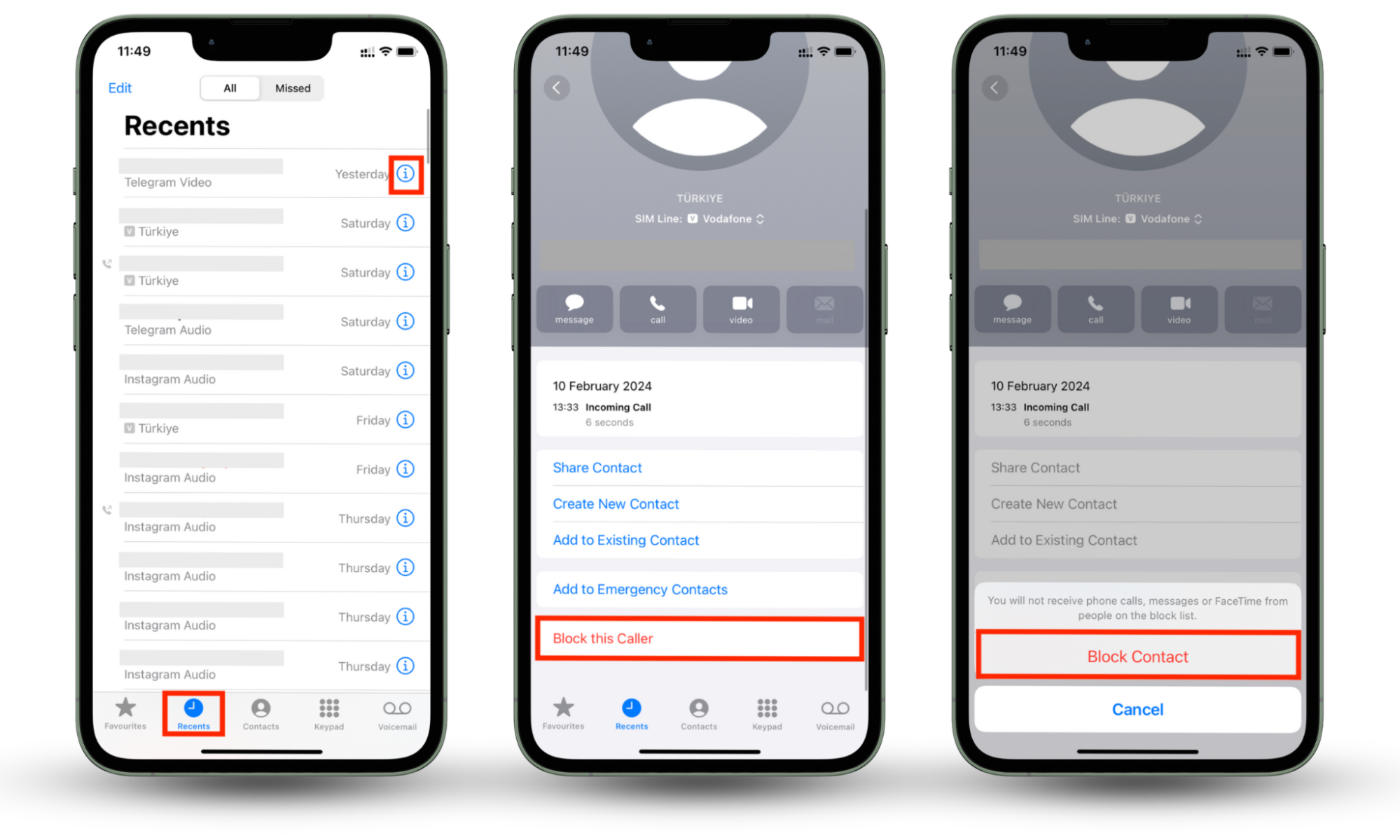
To block your stalker on an Android:
- Open the Phone app and tap the phone number you want to block.
- Press the information icon, then tap Block.
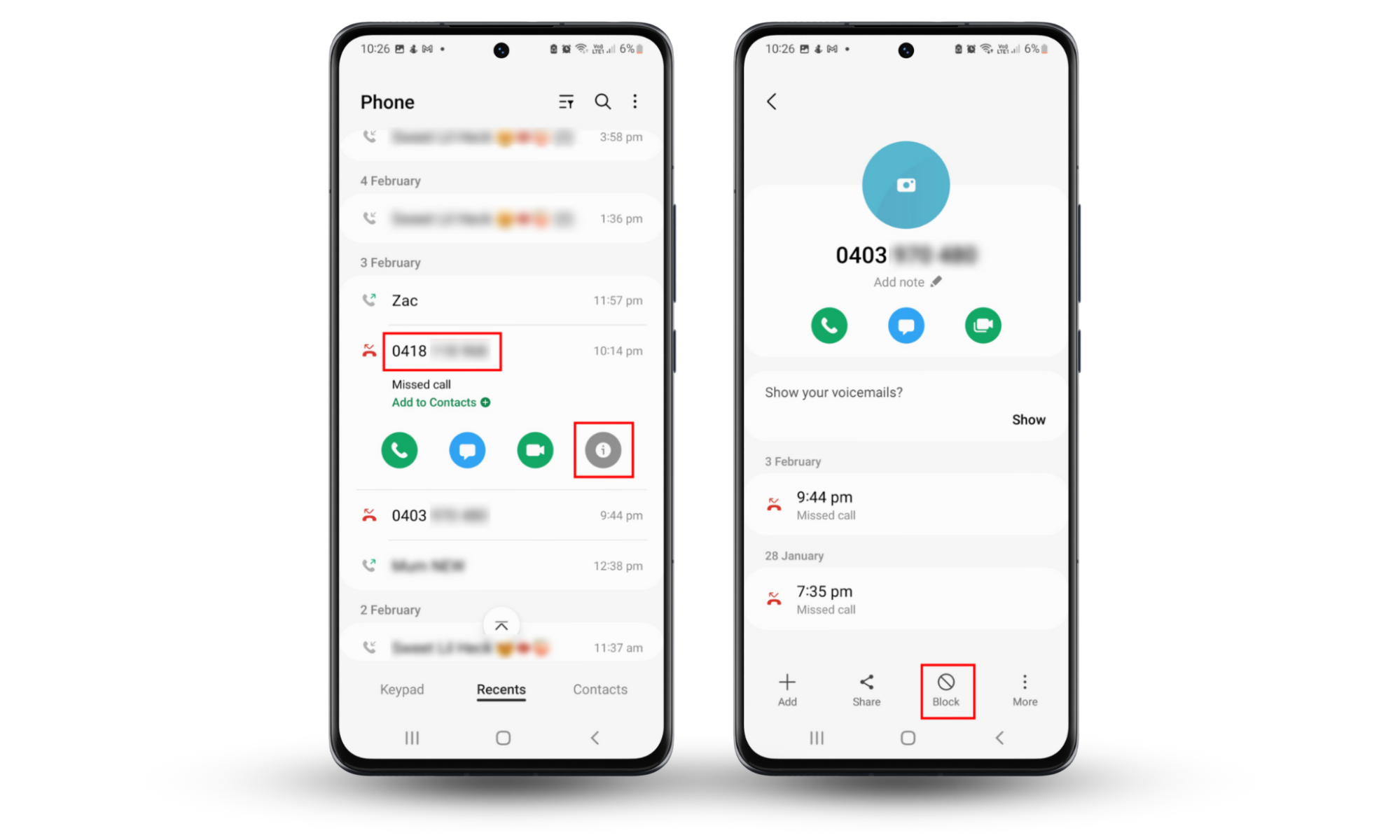
Is your ex looking at your Facebook profile? In case your ex is stalking your social media accounts, you should also take action to prevent the situation from escalating.
To block your stalker on Facebook:
- Open Facebook, then navigate to your stalker’s Facebook account page.
- Press the three dots beside their name, then select Block.
- Press Block one more time.
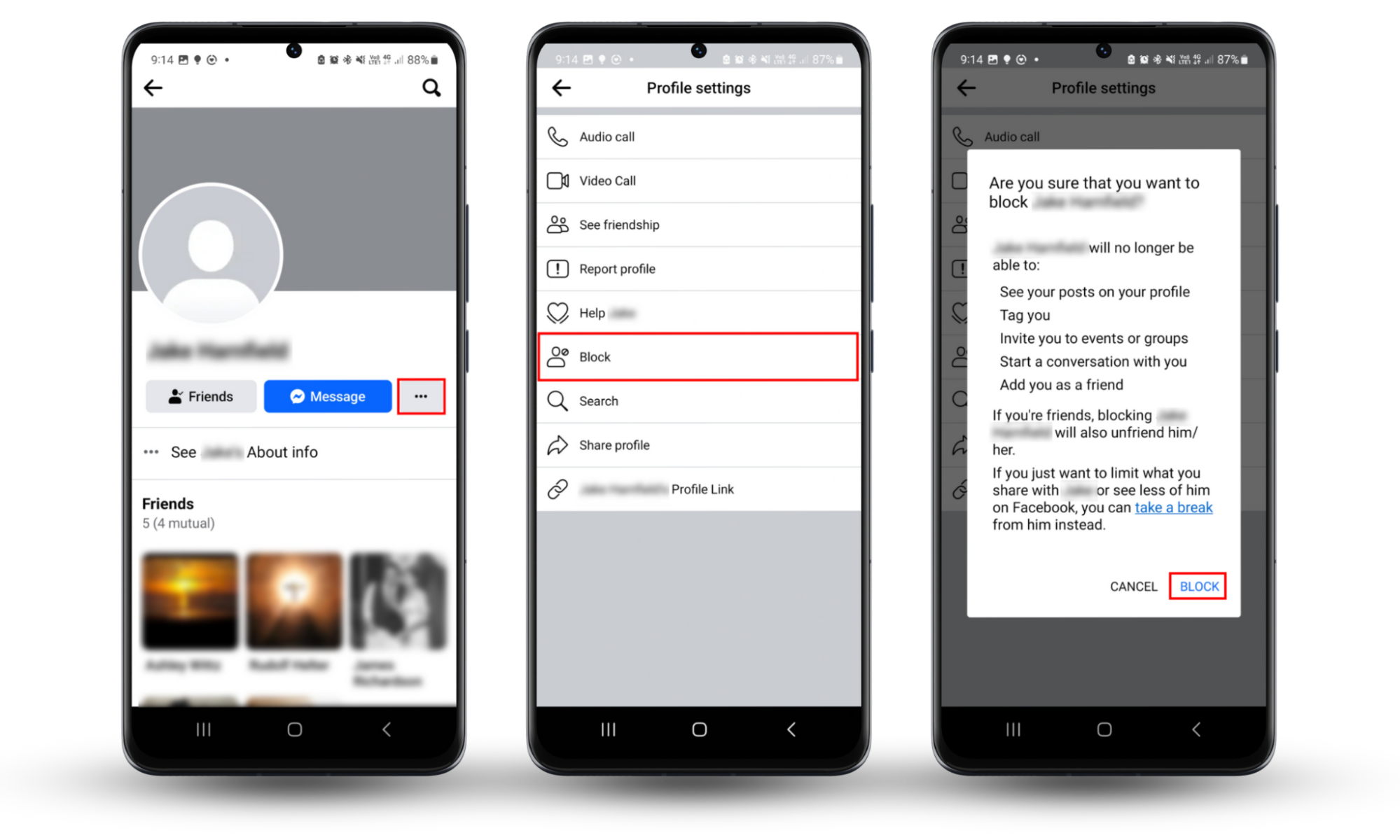
To block your stalker on Instagram:
- Open Instagram, then navigate to your stalker’s personal account.
- Press the three dots at the top-right corner, then choose Block.
- Press Block again to confirm your choice and stop them from Instagram stalking.
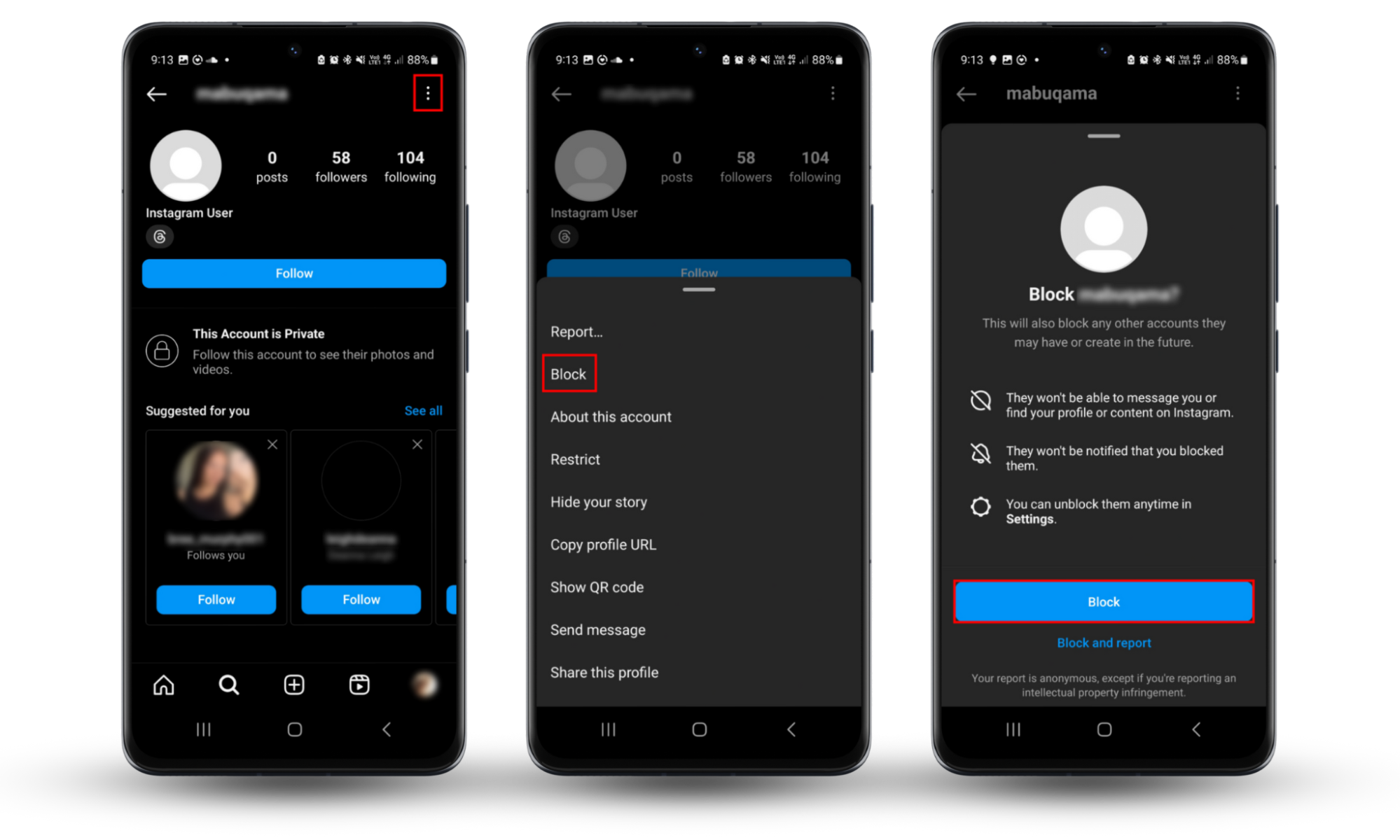
2. Take steps to improve your online privacy
If you’re wondering how to stop cyberstalking, the best way is to enhance your online security. If your ex is stalking your social media, the first step is to check your privacy settings on Instagram, Facebook, and other platforms. Limit who is able to see your posts and personal information to only your close friends and family to prevent your stalker from being able to view your activity.
Next, perform a spyware scan to remove any spyware from your PC, iPhone, or Android. To use Clario AntiSpy’s Spyware detector:
- Download Clario AntiSpy and create an account.
- Go to Spyware scan.
- Select Run a deep scan. This will find any hidden spyware on your device.
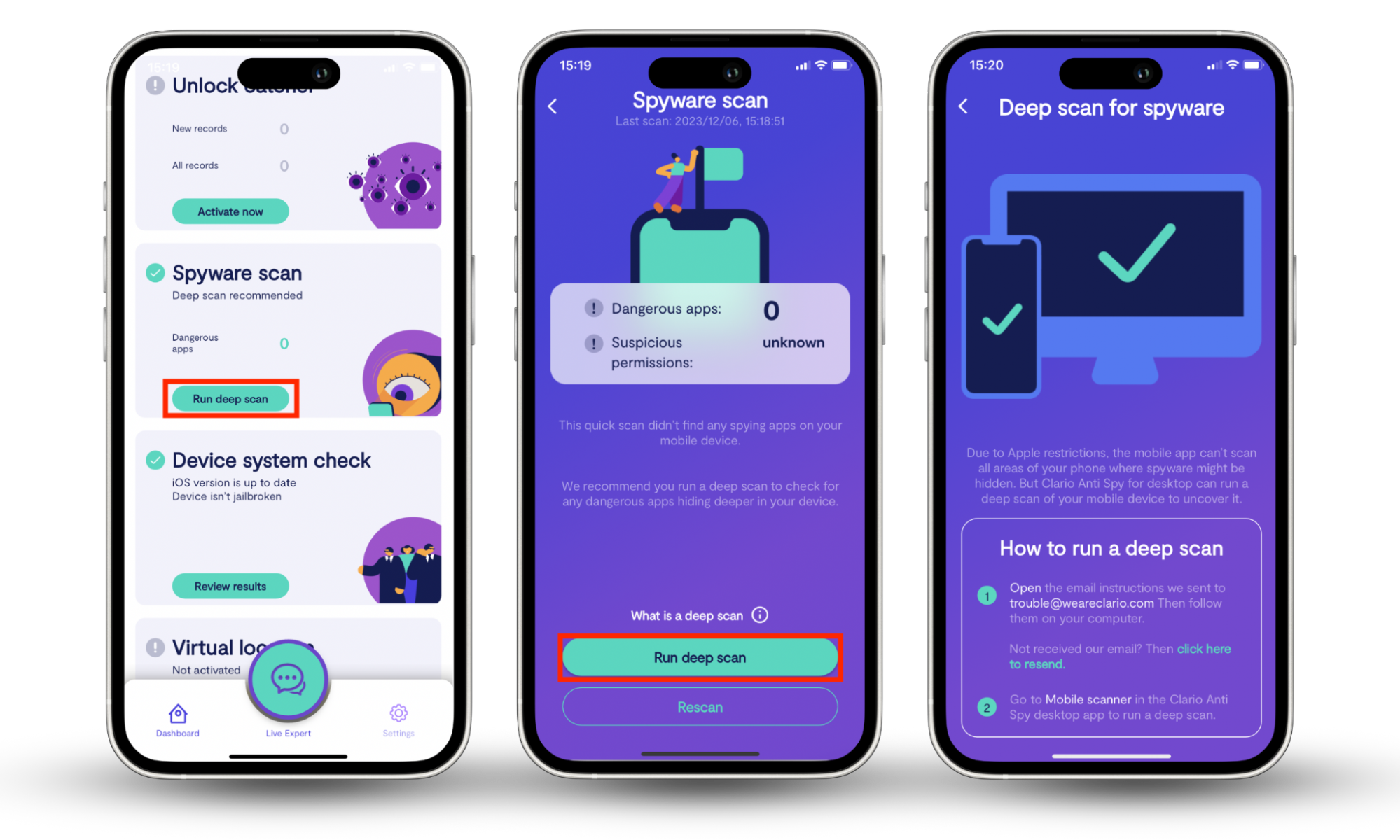
Finally, follow these cybersecurity rules to safeguard your privacy from your stalker:
- Be wary of suspicious friend requests. If you’ve blocked them, your stalker might try to create fake accounts (or use their friend’s accounts) to spy on you. Only accept friend requests if you know for certain who that person is.
- Regularly review your privacy settings. Keep your social media privacy settings as strict as possible to prevent your stalker from being able to track your activity.
- Practice good data hygiene. Avoid posting personal information or anything about your location on social media platforms. The less information that’s online about you, the harder it is for someone to stalk you.
3. Save everything that can prove that you are being stalked
Document any evidence of online stalking, including screenshots, messages, emails, or other interactions that prove that your ex is stalking you online. This evidence could be crucial if you need to pursue legal action later on or if you need to get support from local authorities.
Store this evidence safely on your device and make backups in a secure location in case something happens to the original files.
4. Make a safety plan
Creating a safety plan can not only enhance your current security but also lays the foundation for what you will do if your stalker escalates their behavior. Here are a few things to think about when creating a safety plan:
- Assess the situation. Think about how severe or frequent your stalker’s behavior is and if there are any immediate threats to your safety. This will help you determine how much precaution you need and what level of support to look for.
- Let your family and friends know about the stalker. They can provide emotional support and other assistance if needed. Give them a clear picture of what’s happening so that they understand the situation.
- Establish a support network. Identify the key people in your life that you can reach out to for help in an emergency. For example, you might plan to head to your parent’s house.
- Create a safe word. It can be a good idea to have a safe word or phrase you can say over the phone or in person to alert the support network that you need help without explicitly saying so.
- Consider professional support. Depending on your circumstances, you might want to seek assistance from counselors or victim advocacy groups. They can provide guidance and emotional support and help you recover from stalking or harassment.
5. Consider taking legal action against the cyberstalker
If the stalking continues despite your efforts to address it, you might need to explore legal options. Consult with an attorney or reach out to local law enforcement authorities to discuss your options.
If the stalking behavior escalates or directly threatens your safety, tell your local authorities and give them all the relevant information and proof. They will help you navigate the legal processes and potentially obtain a restraining order or protection order against the cyberstalker.
Conclusion
When faced with stalking, swift action is essential to safeguard your personal information and keep it out of your stalker’s reach. By taking precautionary measures, you can empower yourself in the face of cyberstalking and reclaim control over your life.
Remember, if you feel overwhelmed or unsure about how to proceed, reach out to a local support service or helpline that specializes in supporting victims of stalking or online harassment.
Also, ensure you are safe by running a deep spyware scan on your devices using Clario AntiSpy.


